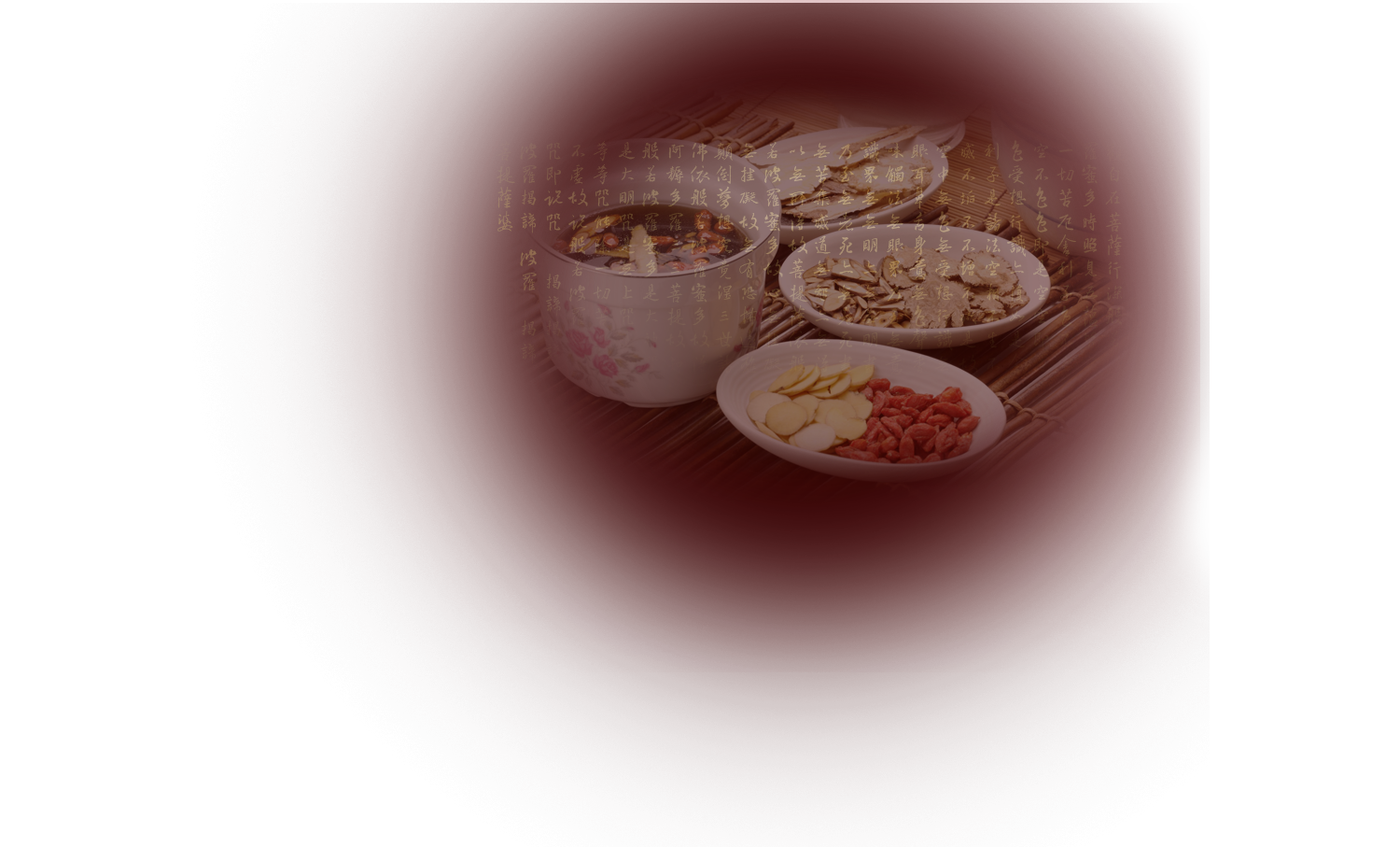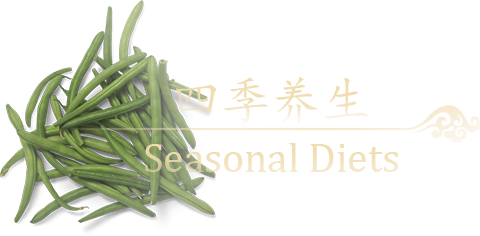

Healthy diets are closely tied to the seasons and the rhythms of nature. Special diets have been used in China for over 1,000 years to help beautify the skin and face, reduce stress and improve sexual function according to the different climates and seasons of the year.
Liver Nourishment in Spring:
Spring is considered the season of growth and the best time to recover tissue and organs of the body. Thus foods are used to fortify and restore one's energy. In addition, it is the season of energetic expansion, therefore foods of a warm nature are not recommended. For the prevention of hypertension and constipation, patients should ingest long fibrous green vegetables along with fruit like pears, and consume more fish products.
- Potato Beef Spinach Soup: Beef soup, potato, cooked beef, carrots, butter, onions, egg, bay leaves, pepper, tomato source, lemon juice.
- Wolfberry with water bamboo: water bamboo, wolfberry, sesame noodles
Heart Nourishment in Summer:
Summer nourishment should adapt to the characteristics of outward Yang repletion. Attention should be paid to protecting the heart and nourishing the Yang to prevent disease. In summer, people tend to sweat, which consumes energy (Qi) and liquid. Whole grains like green beans, soybeans, barley, and buckwheat that increase appetite and clear heat and dampness, are recommended. Salt is lost due to sweating and the lack of salt will result in irregular functioning of the myocardium. At this time, sour foods can help to close the pores to prevent the loss of substances due to excess sweating. Foods that are bitter in nature will benefit the heart organ.
In summer, the decomposition of tissue protein in the human body increases, and therefore the excretion of creatinine in urine and nitrogen in sweat also increases, which results in negative nitrogen balance. The intake of protein should be increased at this time. Proteins such as fish, meat, eggs, milk and beans are recommended. In summer, people tend to perspire more from the heat and eat less, therefore strong tonification is not recommended. Watermelon, green beans, lotus, and zucchini are recommended for clearing summer heat. Red beans cooked with lily bulb clears boils that develop from summer heat. In summer, the metabolism of vitamins also increases, and thus the body requires more supplementation. Foods like tomatoes, watermelon, red bayberry, sweet melon, and peaches are rich in Vitamin C. Cereals, beans, animal liver, lean meat, and eggs are rich in Vitamin-B complex. These foods are recommended in summer for optimum health. The digestive function is weaker during the heat of the summer, therefore foods such as rice and beans which are easy to digest and help nourish the spleen and drain dampness are recommended. Greasy foods are thought to be difficult to digest, will upset the stomach, generate heat and dampness, block meridians and blood flow, and increase the risk of cardiovascular and cerebrovascular diseases.
- Green Bean and Pumpkin soup: matured pumpkin, green beans, salt
- Taro, Lotus, and Sticky rice congee: sticky rice, taro, lotus seeds, ground celery, salt
- Seaweed and Green Bean congee: white rice, seaweed, green beans, salt, pepper powder, and ground celery
- Loach, Tofu stew: loach, tofu, green onion, ginger, salt, cooking wine, chicken essence
- Green Bean and Millet porridge: millet, green bean, honeysuckle, orange peel, red dates.
- Chinese Yam, Polygonatum and Pigeon stew: pigeon, Chinese yam, polygonatum, 50 grams each.
Lung Nourishment in Fall
During the fall, the body yang gradually restrains while yin starts to rise. It is necessary to maintain and tonify yin during the fall in order to adapt the law of nature and set a good foundation of Yang for the coming year. As the weather becomes cool and dry in the autumn, people usually suffer from dry throat and mouth, and cough with scanty sputum. For these conditions, herbs are recommended for moisturizing the mucus of the upper respiratory tract and tonifying yin. Pear, water chestnut, banana, persimmon, kiwi, millet and corn are foods of a cool moisturizing nature. Traditional Chinese Medicine advocates having porridge every morning in the fall to enhance general health.
- Semen Coicis and Water Chestnut congee: semen coicis, water chestnut, and brown rice
- Pumpkin and Chinese yam congee: pumpkin, Chinese yam, and brown rice
- Sesame congee: sesame and brown rice
- Lily and Almond brown rice congee: brown rice, fresh lily root, almond and honey
Kidney Tonification in Winter
The winter regimen should focus on replenishment and storage to recharge the body Qi to thrive and prepare for the vitality of the coming spring. The metabolism of the human body in winter is correspondingly low, because the Yang is restrained. Therefore, the body has to rely on the kidney, which is the driving force of life, in order for the body to adapt to the changes of natural world. During winter, people's appetites and digestive abilities are enhanced, and therefore this is the best time for taking tonics prescribed according to each individual's body constitution. The purpose of winter tonification is to enable the body to intake sufficient nutrients and calories to better withstand the coldness and nourish the blood and Jing, and to build the basic material necessary for disease prevention for the coming spring.
According to Traditional Chinese Medicine, winter diets should consist mainly of bitter foods and less of salty ones. This is because the kidney meridian is prominent in winter, and the kidney is strong in absorbing salty foods, whereas the heart is strong in absorbing bitter foods. Excess amounts of salty foods will overstimulate the kidney causing it to overact on, and thus weaken the heart. Therefore, in winter, people should eat more bitter foods. Winter is also a good season for supplementing protein, fat, and minerals like, potassium, calcium, phosphorus, iron and whole grains that contain vitamin B1 and B2.
- Dates with the Sheep Bones sticky rice congee: red dates, sheep bones, glutinous rice, black beans.
- Mashed Sesame, Walnut, and Lentils: lentils, black sesame, walnut, sugar, lard, 30 grams each.
- Lamb Chops Vermicelli soup: sheep ribs, vermicelli, garlic, parsley, vinegar, ginger, onions.
- Angelica Sheep Kidney porridge: Yang Shen, carrots, glutinous rice, angelica, ginger, sliced onion, scallion.
- Leek, Pigeon Egg porridge: leeks, pigeon eggs, rice, lard, salt, MSG.
- Black Rice congee with dates: black rice, black beans, black sesame powder, dates, brown sugar to taste.
